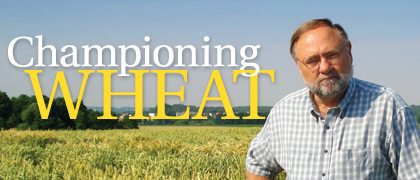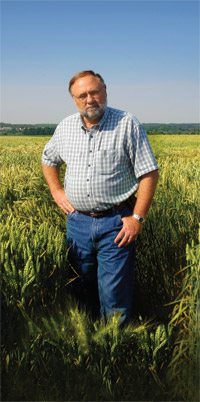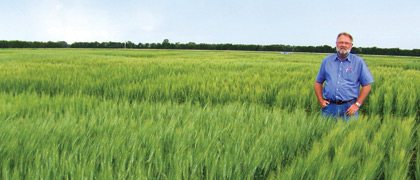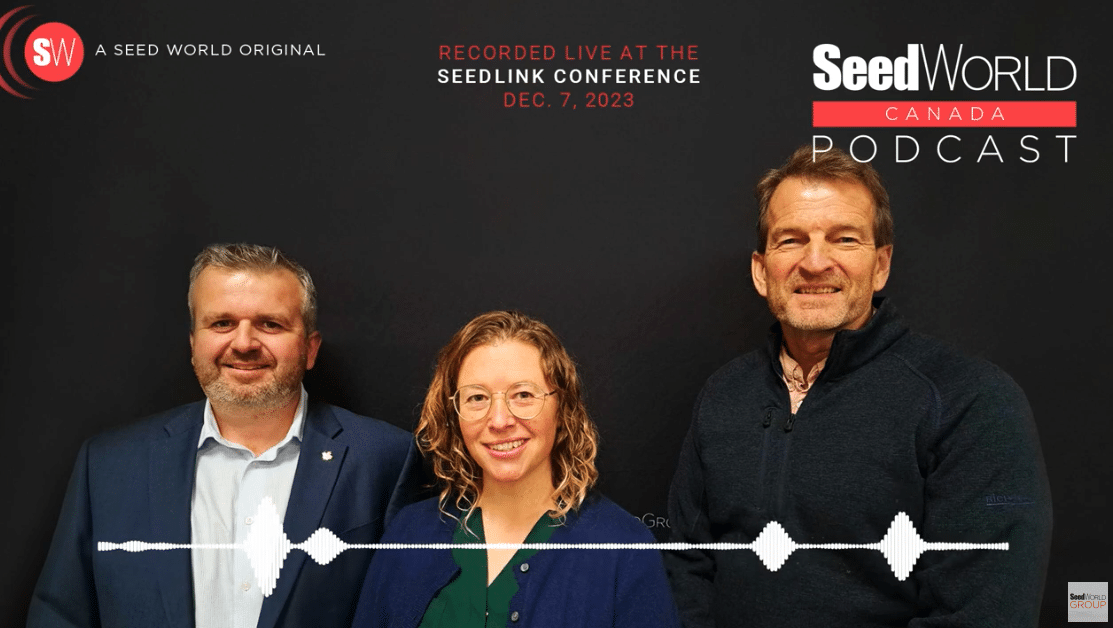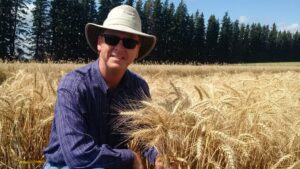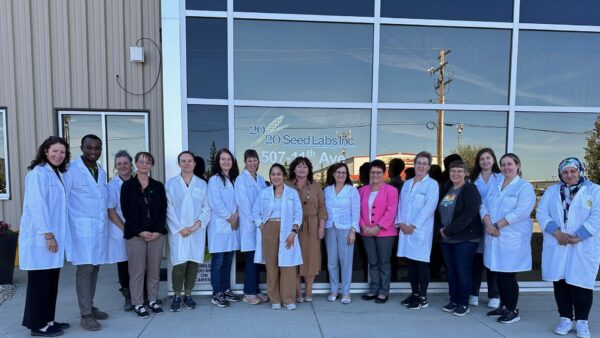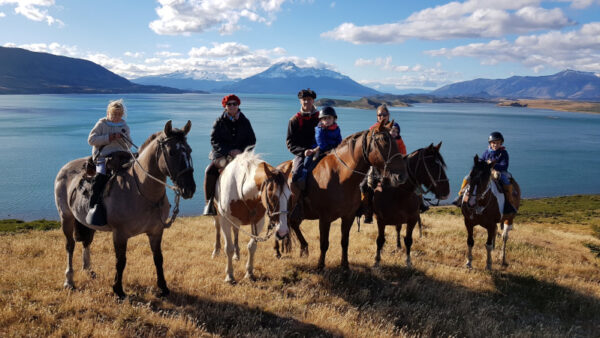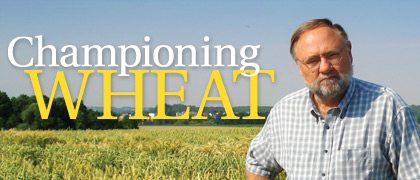
Whether it’s his contributions to wheat breeding, quality or hybrid wheat research, Rob Bruns has spent much of his career promoting excellence in the Canadian seed industry.
Rob Bruns is an American, but spend five minutes talking to him and you’ll quickly discover his Canadian side: a weakness for watching the national curling finals in Calgary, a wealth of friends north of the 49th parallel, and a rich and wide-ranging plant breeding legacy, including many wheat varieties in the annual planting roster of western Canadian growers. He is also the first American to receive the Canadian Seed Trade Association’s highest honour for plant breeding: the 2013 Canadian Plant Breeding and Genetics Award.
Besides his work in wheat breeding and developing new varieties, Bruns has also made enormous contributions to the evaluation of wheat quality in Western Canada.
|
Rob Bruns, winner of the 2013 Canadian Plant Breeding and Genetics Award, has contributed in numerous ways to the Canadian seed industry. |
It is clear that Bruns has contributed in numerous ways to the Canadian seed industry. And according to Peter Entz, assistant vice-president of seed and traits for Richardson International, there is no one more deserving of the CSTA’s annual award. “Rob could have been viewed as a pushy American coming up here trying to change everything and get his varieties in the market, but he wasn’t like that at all,” says Entz.
“He worked really hard within the system, was an excellent team player, and as a result of that was able to positively contribute. The reason for his award, however, is that he was involved in the programs that brought some really top-notch products to Western Canada.”
Wheat Breeding
Bruns is a veteran in the wheat breeding industry, but his career had a nontraditional start. After studying horticulture and spending a brief time in landscape design, Bruns was hired as an assistant plant breeder for a new company, Nickerson Plant Breeders, to start a new winter wheat breeding program for the Great Plains region. At Nickerson, Bruns experienced “the biggest break of his career” when he was hired as the company’s hard winter wheat breeder.
Flash forward just a few years, and Bruns had become research and development director for AgriPro Biosciences, where he oversaw all North American wheat breeding projects. By this point in his career, Bruns had become involved in a wealth of committees and organizations responsible for wheat quality management, including the National Wheat Improvement Committee and the Wheat Quality Council.
In 1988, Bruns began a partnership with the United Grain Growers of Canada to develop adapted wheat varieties for Western Canada. And it’s in this arena that Bruns’ impact on the Canadian seed industry can perhaps be felt most profoundly.
“In 1998, our joint program with UGG faced a crossroads: either get out, because the registration system was too daunting, or increase our investment and overpower it with money,” says Bruns. “We chose to increase our investment, and from that point forward the AgriPro/Syngenta program has been quite successful in registering varieties. My research contribution there was really to serve as a champion of the business.”
Products registered in Canada that found their origins in Rob’s program include 5700 PR, 5701 PR, 5702 PR and SY 985 in the CPSR class, which are commonly used by western Canadian growers today, according to Entz. “These products not only dominated the class, but also have the opportunity in today’s market to significantly expand the class to the benefit of all stakeholders,” he says. “If you examine the CWRS class, Rob’s program is evident in that class as well.”
Entz says that many of these varieties cannot be found in the top market spots of the annual CWB market survey for one reason: Bruns’ emphasis on the importance of certified seed. “If you evaluated the impact of a variety on the amount of certified seed sold, it would paint a much bigger picture,” says Entz. “The importance of certified seed and developing end-use demand for seed products were strong drivers for Rob. He was well connected in the North American wheat business, not just from a seed perspective, but from a grain merchandising perspective as well.”
“[Bruns] did an excellent job of bringing a global understanding to the committee, in terms of the quality characteristics that the market is looking for.” – Peter Entz
Quality Evaluation
Bruns has also made extensive contributions to quality evaluation of wheat varieties in Canada. As a member of the Quality Evaluation Team for Wheat, Rye and Triticale, which makes recommendations to the Prairie Grain Development Committee on varieties to be registered in Canada, Bruns helped establish strong standards for evaluating wheat quality in Western Canada during his stint with the team from 2003 to 2009. “Within the framework of that committee, I helped to introduce a number of tweaks to the system to increase the chances of material making it through the registration system,” explains Bruns.
“I always enjoyed working with Rob on that committee, and the thing I really appreciated about him is his thorough understanding of wheat quality in Western Canada and the U.S. and, really, around the world,” says Entz. “He did an excellent job of bringing a global understanding to the committee, in terms of the quality characteristics that the market is looking for. [And] he had a strong commercial bent.
“He added a lot of wisdom and guidance to that group and helped us think a little broader than we might have otherwise,” says Entz.
Bruns’ “global understanding” is no doubt rooted in his years of experience working in the global seed business as head of NAFTA Cereals Seed for Syngenta, during which time he worked in corporate management and global cereals leadership. From 2011 until his retirement this year, Bruns has served as head of the North American Cereals Portfolio for Syngenta — and in the process, clocked endless hours travelling to Canada and abroad.
“I travelled over a hundred nights a year for 25 years,” laughs Bruns.
“I’ve done everything in the seed business, and there’s no greater reward than having a major variety in the marketplace. That’s number one.” — Rob Bruns
Measuring Success
In Bruns’ own estimation, the successful registration of high-quality wheat varieties ranks as his greatest contribution to the Canadian seed industry. “There have been some great products at the grower level. I’ve done everything in the seed business, and there’s no greater reward than having a major variety in the marketplace,” he says. “That’s number one.”
It’s obvious that for Bruns, wheat breeding and the evaluation of wheat quality go hand-in-hand, and his contributions to wheat quality are also high on his list of achievements. “It’s an area that I spent an extraordinary amount of time working on and trying to understand, working downstream with people using the product, and really affecting, both in the U.S. and Canada, the overall quality and direction of the research,” he says.
But there’s another area in which Bruns has had an influence. Even if it will not be felt until he is well into his retirement, hybrid wheat breeding is no less of a significant part of his legacy. “I’ve spent quite a long time managing hybrid wheat research and introduction into the marketplace in the U.S. and Canada, and recently with Syngenta, shepherding a major investment in hybrid wheat,” says Bruns.
If all goes well, these hybrids, which have Canadian-specific characteristics, will be at the farmer level in eight to 10 years.
Bruns claims another success as key to his career — his friendships with people from across Western Canada. “Learning to have fun like a true Canadian has been one of my biggest successes,” he laughs.
Entz can name a few more indicators of Bruns’ extensive successes in Canada. “There are a number of ways to recognize success, but at the end of the day, especially in Western Canada, a good measurement is the number of varieties your program registers and the impact they’ve had in the market,” he says. “Rob [has] certainly left his mark in Canada, through the varieties that were registered, the partnerships he was involved in, the impact he had working on the Quality Evaluation Team and the many people that he interacted with and mentored along the way.”
After all those hours spent travelling to and from the United States and Canada, enjoying his retirement is top of Bruns’ to-do list these days. Winning the Canadian Plant Breeding and Genetics award, he says, “is very humbling.” But in the future, his life will take a different direction. “I’m looking forward to enjoying the fall of my life with my wife and giving back to the community.”
Julienne Isaacs


